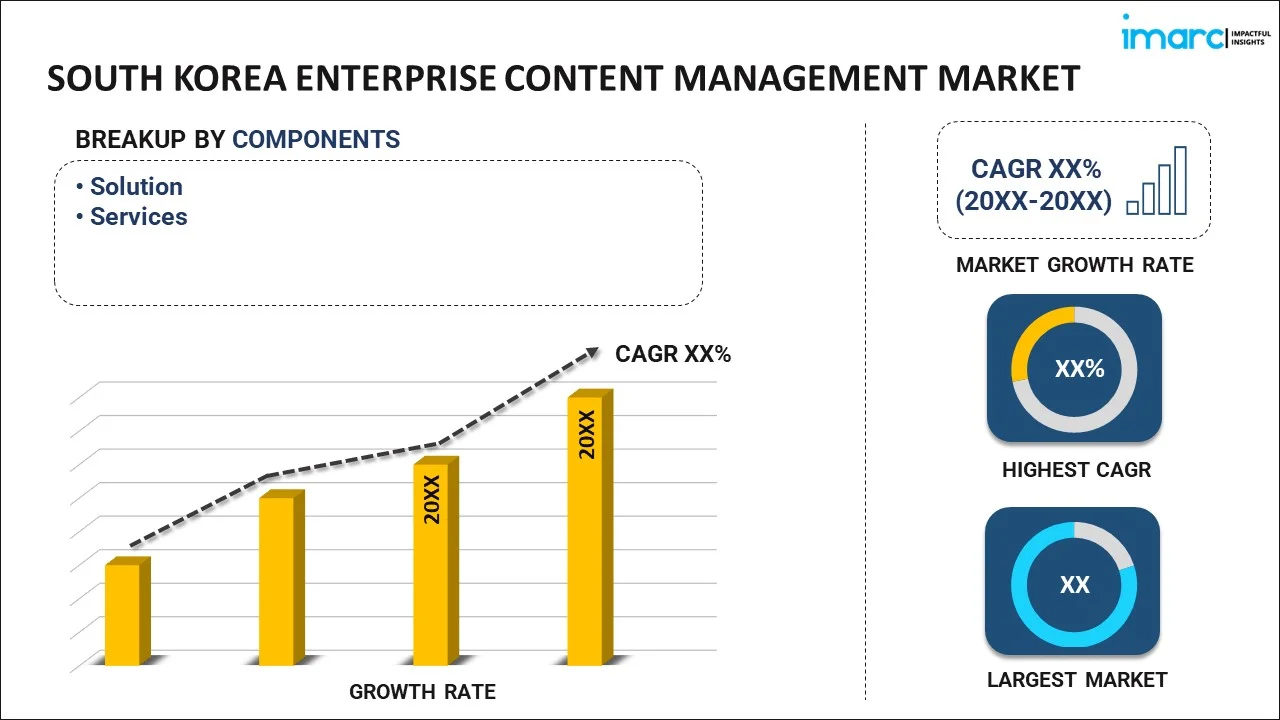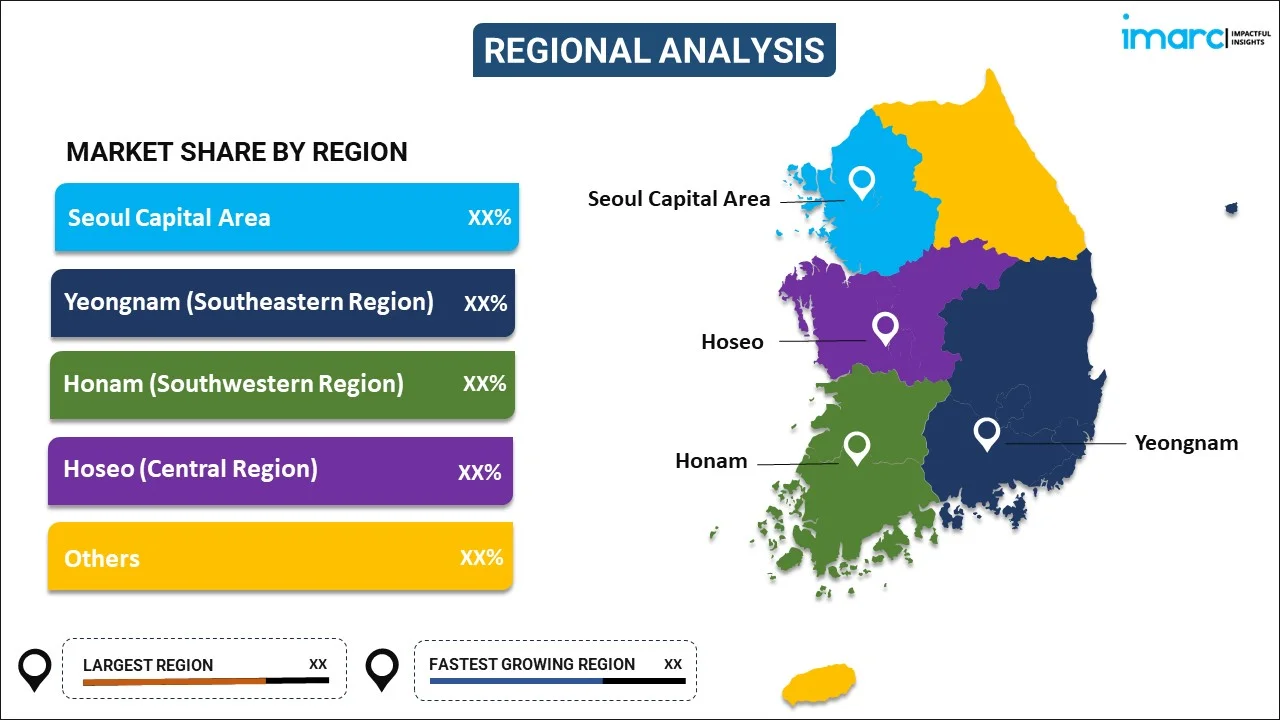
South Korea Enterprise Content Management Market Report by Component (Solution, Services), Enterprise Size (Small and Medium-sized Enterprises, Large Enterprises), Deployment Mode (On-premises, Cloud-based), End Use Industry (Telecom and IT, Banking Financial Services and Insurance (BFSI), Retail, Education, Manufacturing, Media and Entertainment, Government, Healthcare, and Others), and Region 2025-2033
Market Overview:
South Korea enterprise content management market size reached USD 1,446.5 Million in 2024. Looking forward, IMARC Group expects the market to reach USD 4,593.8 Million by 2033, exhibiting a growth rate (CAGR) of 13.7% during 2025-2033. The growing trend of remote work and collaboration, which is increasing the demand for enterprise content management solutions that enable efficient document sharing and collaboration across geographically dispersed teams, is driving the market.
|
Report Attribute
|
Key Statistics
|
|---|---|
|
Base Year
|
2024 |
|
Forecast Years
|
2025-2033
|
|
Historical Years
|
2019-2024
|
| Market Size in 2024 | USD 1,446.5 Million |
| Market Forecast in 2033 | USD 4,593.8 Million |
| Market Growth Rate (2025-2033) | 13.7% |
Enterprise content management (ECM) is a systematic approach to capture, manage, store, and deliver an organization's documents and content. It involves the use of technologies, strategies, and processes to organize, categorize, and control information throughout its lifecycle. ECM aims to streamline business processes, enhance collaboration, and ensure regulatory compliance by providing a centralized and secure repository for digital and physical content. Key components of ECM include document management, records management, workflow automation, and collaboration tools. It enables efficient document retrieval and version control and ensures that information is accessible to the right individuals at the right time. ECM solutions are designed to improve overall productivity, reduce operational costs, and mitigate risks associated with information mismanagement. As businesses generate and consume vast amounts of data, ECM becomes essential for maintaining order, facilitating decision-making, and fostering a more organized and efficient work environment.
South Korea Enterprise Content Management Market Trends:
The enterprise content management market in South Korea is witnessing substantial growth, driven by several key factors. Firstly, the increasing digitization of business processes across industries is a primary driver. As organizations strive to enhance operational efficiency and streamline workflows, the demand for ECM solutions that facilitate seamless content creation, storage, and retrieval continues to surge. Moreover, the rising need for regulatory compliance is propelling the ECM market forward. Stringent regulations and data governance requirements necessitate robust ECM systems to ensure data security, integrity, and compliance. In tandem with this, the escalating volume of digital content generated daily contributes to the market's expansion. The proliferation of multimedia content, documents, and other digital assets necessitates advanced ECM solutions to effectively manage and organize diverse data types. In conclusion, the ECM market in South Korea is being propelled by the confluence of digital transformation, regulatory demands, and data proliferation, with organizations increasingly recognizing the strategic importance of effective content management in achieving their business objectives.
South Korea Enterprise Content Management Market Segmentation:
IMARC Group provides an analysis of the key trends in each segment of the market, along with forecasts at the country level for 2025-2033. Our report has categorized the market based on component, enterprise size, deployment mode, and end use industry.
Component Insights:

- Solution
- Document Management System (DMS)
- Web Content Management (WCM)
- Document-Centric Collaboration (DCC)
- Records Management
- Document Imaging
- Business Process Management (BPM)
- Others
- Services
- Professional
- Managed
The report has provided a detailed breakup and analysis of the market based on the component. This includes solution (document management system (DMS), web content management (WCM), document-centric collaboration (DCC), records management, document imaging, business process management (BPM), and others) and services (professional and managed).
Enterprise Size Insights:
- Small and Medium-sized Enterprises
- Large Enterprises
A detailed breakup and analysis of the market based on the enterprise size have also been provided in the report. This includes small and medium-sized enterprises and large enterprises.
Deployment Mode Insights:
- On-premises
- Cloud-based
The report has provided a detailed breakup and analysis of the market based on the deployment mode. This includes on-premises and cloud-based.
End Use Industry Insights:
- Telecom and IT
- Banking Financial Services and Insurance (BFSI)
- Retail
- Education
- Manufacturing
- Media and Entertainment
- Government
- Healthcare
- Others
A detailed breakup and analysis of the market based on the end use industry have also been provided in the report. This includes telecom and IT, banking financial services and insurance (BFSI), retail, education, manufacturing, media and entertainment, government, healthcare, and others.
Regional Insights:

- Seoul Capital Area
- Yeongnam (Southeastern Region)
- Honam (Southwestern Region)
- Hoseo (Central Region)
- Others
The report has also provided a comprehensive analysis of all the major regional markets, which include Seoul Capital Area, Yeongnam (Southeastern Region), Honam (Southwestern Region), Hoseo (Central Region), and Others.
Competitive Landscape:
The market research report has also provided a comprehensive analysis of the competitive landscape. Competitive analysis such as market structure, key player positioning, top winning strategies, competitive dashboard, and company evaluation quadrant has been covered in the report. Also, detailed profiles of all major companies have been provided.
South Korea Enterprise Content Management Market Report Coverage:
| Report Features | Details |
|---|---|
| Base Year of the Analysis | 2024 |
| Historical Period | 2019-2024 |
| Forecast Period | 2025-2033 |
| Units | Million USD |
| Scope of the Report | Exploration of Historical and Forecast Trends, Industry Catalysts and Challenges, Segment-Wise Historical and Predictive Market Assessment:
|
| Components Covered |
|
| Enterprise Sizes Covered | Small and Medium-sized Enterprises, Large Enterprises |
| Deployment Modes Covered | On-premises, Cloud-based |
| End Use Industries Covered | Telecom and IT, Banking Financial Services and Insurance (BFSI), Retail, Education, Manufacturing, Media and Entertainment, Government, Healthcare, Others |
| Regions Covered | Seoul Capital Area, Yeongnam (Southeastern Region), Honam (Southwestern Region), Hoseo (Central Region), Others |
| Customization Scope | 10% Free Customization |
| Post-Sale Analyst Support | 10-12 Weeks |
| Delivery Format | PDF and Excel through Email (We can also provide the editable version of the report in PPT/Word format on special request) |
Key Questions Answered in This Report:
- How has the South Korea enterprise content management market performed so far and how will it perform in the coming years?
- What is the breakup of the South Korea enterprise content management market on the basis of component?
- What is the breakup of the South Korea enterprise content management market on the basis of enterprise size?
- What is the breakup of the South Korea enterprise content management market on the basis of deployment mode?
- What is the breakup of the South Korea enterprise content management market on the basis of end use industry?
- What are the various stages in the value chain of the South Korea enterprise content management market?
- What are the key driving factors and challenges in the South Korea enterprise content management?
- What is the structure of the South Korea enterprise content management market and who are the key players?
- What is the degree of competition in the South Korea enterprise content management market?
Key Benefits for Stakeholders:
- IMARC’s industry report offers a comprehensive quantitative analysis of various market segments, historical and current market trends, market forecasts, and dynamics of the South Korea enterprise content management market from 2019-2033.
- The research report provides the latest information on the market drivers, challenges, and opportunities in the South Korea enterprise content management market.
- Porter's five forces analysis assist stakeholders in assessing the impact of new entrants, competitive rivalry, supplier power, buyer power, and the threat of substitution. It helps stakeholders to analyze the level of competition within the South Korea enterprise content management industry and its attractiveness.
- Competitive landscape allows stakeholders to understand their competitive environment and provides an insight into the current positions of key players in the market.
Need more help?
- Speak to our experienced analysts for insights on the current market scenarios.
- Include additional segments and countries to customize the report as per your requirement.
- Gain an unparalleled competitive advantage in your domain by understanding how to utilize the report and positively impacting your operations and revenue.
- For further assistance, please connect with our analysts.
 Request Customization
Request Customization
 Speak to an Analyst
Speak to an Analyst
 Request Brochure
Request Brochure
 Inquire Before Buying
Inquire Before Buying




.webp)




.webp)












